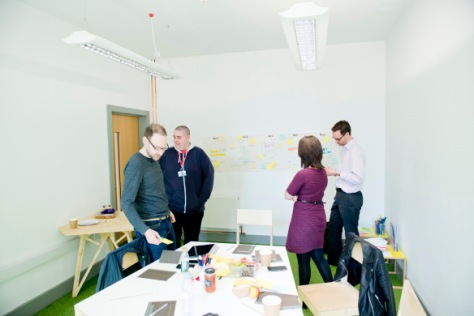A new employee and Entrepreneur in Residence have joined Innovation Birmingham’s Entrepreneurs for the Future programme, as three new tech start-ups have enrolled. In the five years the programme has been running, the start-ups have secured over £7 million of investment during initial funding rounds.
Entrepreneurs for the Future is part-funded by the European Regional Development Fund (ERDF). To date, the programme has incubated 105 start-ups, with close to 200 new employee and director positions created since November 2009. The latest new tech ventures are: Spica Technologies – a software product development business; Supermeal.co.uk, which is a direct competitor of Just Eat; and Wander City, which has set out to provide real time information to users based on their personal profile and geolocation.
The new Entrepreneur in Residence position has been taken up by Andy Honess, who is a tech advisor and investor, with over 25 years’ experience in the enterprise software industry. Andy has held senior sales and executive leadership positions in IBM, Siebel and a number of start-ups. He was also the managing director and vice president of QlikTech for five years, helping the company to a successful IPO on the NASDAQ.
Holly Watkins has also joined the team as the Entrepreneurs for the Future Programme Administrator, having completed her Level 2 Apprenticeship via Birmingham Metropolitan College.
Dr David Hardman MBE, CEO of Innovation Birmingham said: “The continued growth of the Entrepreneurs for the Future programme is driving the success of the Innovation Birmingham Campus. Our Faraday Wharf building is fully let, with a lot of the recent uptake in office space coming from the expansion of the businesses that have graduated from the Entrepreneurs for the Future centre. These innovative businesses are creating new jobs for the local economy and driving the growth of Birmingham’s tech community.
“Launching a new business in a sector specific incubation centre ensures it has a much better chance of succeeding and becoming commercially viable. We have a full-time team working in the centre, together with the three Entrepreneurs in Residence, who guide, drive, motivate and facilitate connections for the start-ups, to ensure they become investment-ready and/or revenue generating in as short a time as possible. “
Those enrolled onto the Entrepreneurs for the Future programme benefit from up to nine months free office space, telecoms, meeting rooms and superfast broadband. In addition, there is continued mentoring from the Entrepreneurs in Residence, regular visiting expert sessions, a series of workshops and events, networking opportunities and peer-to-peer support. All of this support comes for free; Innovation Birmingham does not take an equity stake in the start-up businesses, as enrolment onto the Entrepreneurs for the Future programme is part-funded by an ERDF grant.
Innovation Birmingham has designed its tech incubation programme in order to capture serial entrepreneurs, who as individuals are working on more than one project concurrently. The Innovation Birmingham Campus is open 24/7, enabling people to work flexibly, or cram in the hours when needed.











